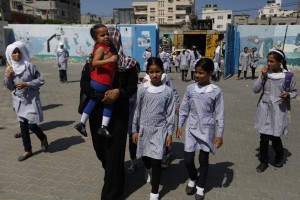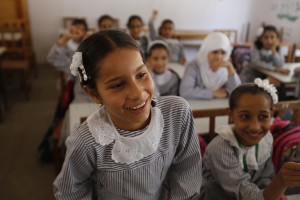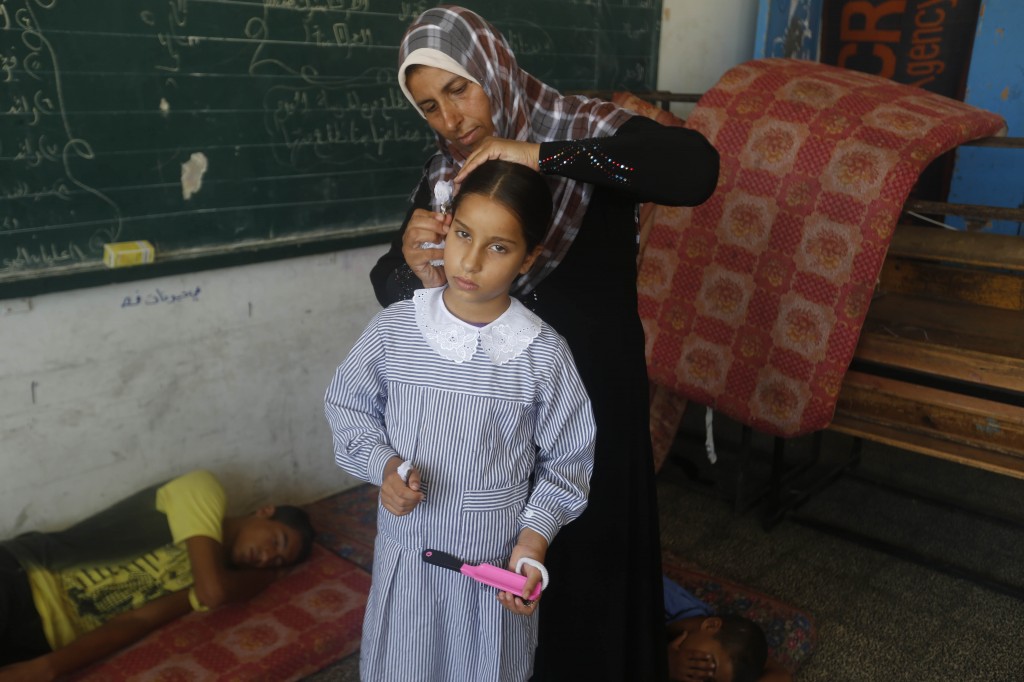人道救援, 亞洲其他地區2014年10月08日
Despite the ceasefire, huge needs remain

樂施會
樂施會是國際扶貧機構,致力透過政策倡議、社區扶貧及人道救援服務,與大眾共建「無窮世界」。
10-year-old Nesma Al Wadiya used to enjoy going to school. But now her school is no longer just a place of learning and seeing her friends – it’s a constant reminder that her home is gone.
Each night she sleeps in a classroom – her family’s only shelter as their house was completely destroyed during the 50 days of war. Six weeks after the ceasefire, more than 100,000 people in Gaza remain homeless and hundreds of thousands more have no running water. Children like Nesma still shelter in crowded school buildings where Oxfam and partners are delivering clean water.
“My whole life is about schools now,” Nesma says sadly. “I don’t like going to school anymore. It makes me think of bad memories. Now we don’t have a house and I am fed up of seeing classrooms and blackboards all day and night.”
 More than 200 schools were damaged or destroyed by bombing, and dozens more turned into makeshift shelters. Despite the difficulties, the school year resumed this month. Nesma’s mother, Sahar, knows it may be a long time before her family can go home, but she decided to send her daughter back to her old school rather than find a new one closer to their shelter: “It’s already overwhelming for Nesma to lose her house. I wanted her to study in the school that she knows, with her friends and the teachers that she knows.”
More than 200 schools were damaged or destroyed by bombing, and dozens more turned into makeshift shelters. Despite the difficulties, the school year resumed this month. Nesma’s mother, Sahar, knows it may be a long time before her family can go home, but she decided to send her daughter back to her old school rather than find a new one closer to their shelter: “It’s already overwhelming for Nesma to lose her house. I wanted her to study in the school that she knows, with her friends and the teachers that she knows.”
The bombing caused billions of dollars worth of damage to Gaza’s vital infrastructure and people’s homes, schools, hospitals and water systems. The scale of destruction will take years to repair – a task made even more difficult by the seven year-old Israeli blockade, which restricts goods and people moving in and out of Gaza. Vital construction materials for rebuilding homes like Nesma’s are restricted.
However, the psychological scars may take even longer to recover from. Many parents are gravely worried about the impact of the war on the children – many of whom have lost friends and family members as well as homes. The UN estimates more than 370,000 children in Gaza are in need of psychosocial support.
 “It is good that my school was not destroyed and I can still see my friends,” says Nesma. “But this does not help so much because I still go back to sleep in a school.”
“It is good that my school was not destroyed and I can still see my friends,” says Nesma. “But this does not help so much because I still go back to sleep in a school.”
Oxfam and our partners are providing safe water to Nesma’s school and many others like it, as well as residential neighbourhoods across Gaza. We are running hygiene classes in schools to help people sheltering there learn how to manage the water safely and reduce the risk of illness, given the basic conditions. This emergency work is funded by the UK Department for International Development (DFID) and the European Commission Humanitarian Aid and Civil Protection (ECHO).

